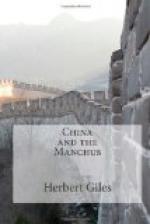Christianity was officially recognized in 1692, and an Imperial edict was issued ordering its toleration throughout the empire. The discovery of the Nestorian tablet in 1625 had given a considerable impulse, in spite of its heretical associations, to Christian propagandism; and it was estimated that in 1627 there were no fewer than thirteen thousand converts, many of whom were highly placed officials, and even members of the Imperial family. An important question, however, now came to a head, and completely put an end to the hope that China under the Manchus might embrace the Roman Catholic faith. The question was this: May converts to Christianity continue the worship of ancestors? Ricci, the famous Jesuit, who died in 1610, and who is the only foreigner mentioned by name in the dynastic histories of China, was inclined to regard worship of ancestors more as a civil than a religious rite. He probably foresaw, as indeed time has shown, that ancestral worship would prove to be an insuperable obstacle to many inquirers, if they were called upon to discard it once and for all; at the same time, he must have known that an invocation to spirits, coupled with the hope of obtaining some benefit therefrom, is worship pure and simple, and cannot be explained away as an unmeaning ceremony.
Against the Jesuits in this matter were arrayed the Dominicans and Franciscans; and the two parties fought the question before several Popes, sometimes one side carrying its point, and sometimes the other. At length, in 1698, a fresh petition was forwarded by the Jesuit order in China, asking the Pope to sanction the practice of this rite by native Christians, and also praying that the Chinese language might be used in the celebration of mass. K`ang Hsi supported the Jesuits in the view that ancestral worship was a harmless ceremony; but after much wrangling, and the dispatch of a Legate to the Manchu court, the Pope decided against the Jesuits and their Imperial ally. This was too much for the pride of K`ang Hsi, and he forthwith declared that in future he would only allow facilities for preaching to those priests who shared his view. In 1716, an edict was issued, banishing all missionaries unless excepted as above. The Emperor had indeed been annoyed by another ecclesiastical squabble, on a minor scale of importance, which had been raging almost simultaneously round the choice of an appropriate Chinese term for God. The term approved, if not suggested, by K`ang Hsi, and indisputably the right one, as shown by recent research, was set aside by the Pope in 1704 in favour of one which was supposed for a long time to have been coined for the purpose, but which had really been applied for many centuries previously to one of the eight spirits of ancient mythology.




